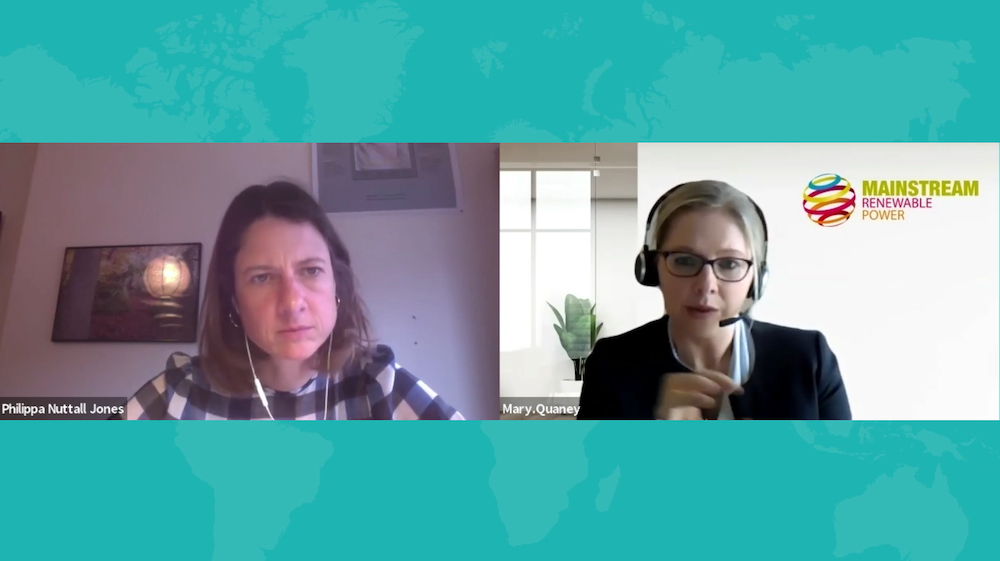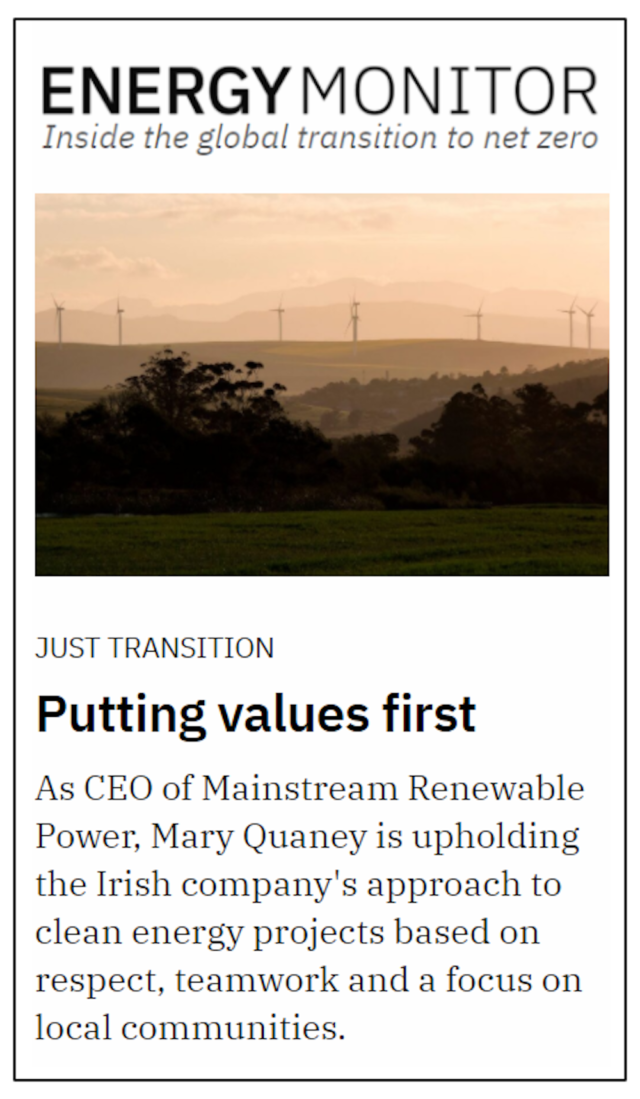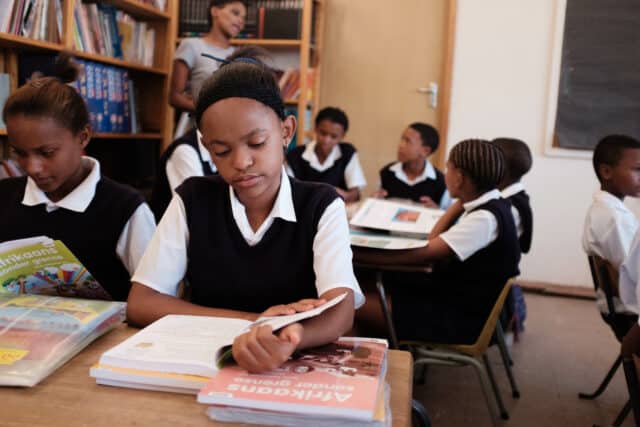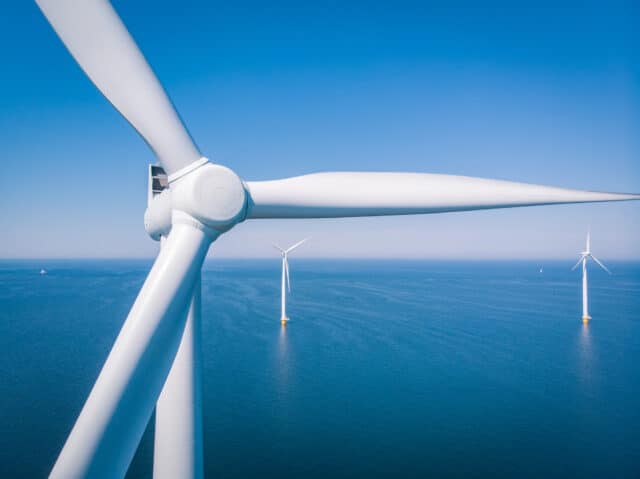Mary Quaney: Values lie at the core of our development record
Category
Leadership
Date
11 March 2021
Location
Global

Mainstream Chief Executive Officer Mary Quaney has spoken about her commitment to a Values-led approach to accelerating the global energy transition.
In an interview to mark this week’s International Women’s Day, she described how, when “there are no guarantees that a green company is a good company”, respect and teamwork have proven essential pillars that underpin Mainstream’s world-leading development standards.
She told also Philippa Nuttall Jones, for the Energy Monitor article reprinted below, that the company is reaping the benefits from “doing the right thing” in both the workplace and the communities in which it operates.
PNJ: How does Mainstream compare with other Renewables companies?
MQ: We are very much a values-driven company. We are focused on respect and teamwork, and follow a communities-based approach to project development. We are very focused on doing the right thing and delivering top-quality projects that will stand the test of time.
Before starting a project, we get to know local communities. Often before we sign up a piece of land, we spend loads of time on the ground drinking cups of tea or the local equivalent. We spend time getting to know people’s needs and explain what renewables means for the local community and livelihoods.
We do not then disappear, but we keep up that focus throughout the project development cycle. When the time for construction comes, we have already built up a strong relationship of trust and two-way communication, often over a long period of time. This approach helps us minimise challenges to our projects.
PNJ: Do you rely on certain standards to guide this way of working?
MQ: We develop projects to meet the highest international and Mainstream standards. Often we go above and beyond local requirements.
In South Africa, we work very closely with the farming community. Renewables and agriculture go well together: the impact on farmers is minimal, and wind or solar power gives them a regular, recurring source of income.
In Chile, in local communities that know nothing about renewables, for example, we might focus on supporting skills and job creation, and ensuring funds flow back into communities to support education.
Renewable projects can be an asset for an area and local people, and for the wider infrastructure needs of a country.
If local requirements are below our requirements, we will develop to our own standards. This might mean, for example, carrying out an environmental impact assessment for a longer period of time.
PNJ: Does this approach have an impact on your project flow?
MQ: We invest more in projects, but they are, as a result, of greater quality, fit better with the local environment and will stand the test of time. We put lots of time into planning and development, but this means projects run into fewer challenges and have a better chance of being built and coming onto the system.
At a macro level, our projects take more or less the same length of time as those of our competitors. Because we put more effort into the earlier stages, there are fewer challenges in later stages.
We are probably more careful about how we spend money. We will put lots of time and effort into feasibility studies. In this way, projects are de-risked.
At the same time, the economics of a project have to make sense and we have to be competitive.
PNJ: Mainstream is certified as a Great Place to Work. What is the story behind this?
MQ: There are no guarantees that a green company is a good company. At Mainstream we have always been really focused on employee engagement and creating a positive culture where people work well together and enjoy what they do.
From my perspective, ensuring employees are engaged and committed goes back to our core values of making sure we are doing the right thing in the right way.
We live these values. They are not just logos on a wall. We run an annual survey to get feedback from colleagues and see where we need to improve.
PNJ: Despite all this good work by you and others, the world is not on course to meet the goals of the Paris Agreement. What needs to change?
MQ: There needs to be very significant political change. COP26 is an opportunity to make the energy transition more international instead of taking a nation-by-nation approach.
In Europe, for example, the entire energy and grid infrastructure needs dramatic change. It is set up for fossil fuels, based on a national approach. The issues that arose recently in Texas – an island grid system – as a result of extreme weather are a very serious lesson. We need interconnected grids that allow much more significant levels of renewables than today’s systems. We need political and international collaboration to allow that.
There is an opportunity for greater electrification with renewables the lowest cost source of power that can be brought online at scale. In Ireland, we have massive offshore wind potential that is mainly untapped and could be delivered into mainland Europe with an interconnected grid. The same could happen with solar in the south of Europe and wind in the North Sea.
We have a fantastic opportunity. There is a huge wall of very cheap capital that is chasing opportunities for sustainable investment. There needs to be long-term commitments for that capital to have an impact.
The conditions are there for this to happen; this is clear from the organisation around and commitment to COP26. The Biden administration is also making very meaningful commitments. There is a huge amount of scope for very significant change that can happen this year and set us on the right trajectory, but this change needs to happen fast.
PNJ: Can change happen at the speed required?
MQ: Industry is changing very rapidly, but that pace of change is not very well understood and it needs to be matched by governments.
Previously, renewables development had a project-by-project approach. Now, for example, in Chile we are building ten hybrid wind and solar projects that will supply power 24/7, 365 days a year.
The decrease in the price of storage is happening much quicker than people expected. Offshore wind turbines are getting much bigger and the costs of offshore continue to fall. I also think that floating offshore technology will become cost-competitive faster than many expect.
At a personal level, change is not very far away. The management of power at a consumer level is becoming much more sophisticated. Machines will soon decide when they need to be charged. There are massive changes under way and huge amounts of capital ready to be invested.
PNJ: We are carrying out this interview to celebrate International Women’s Day. Is such a focus still relevant today?
Yes. In terms of gender balance, we still have quite a way to go as an industry. Women make up 22% of the global energy industry workforce, 21% of the global wind sector workforce and 32% of the global renewables workforce.
The International Renewable Energy Agency estimates the number of jobs in renewables will triple from ten million in 2017 to 30 million in 2050. We need to find the right gender balance in this. We are an attractive industry for people to join and there is lots of potential. We also agree that diversity overall is crucially important, not just gender.
PNJ: What are you doing at Mainstream to diversify your workforce?
MQ: This year we are focusing on inclusivity and diversity as well as meeting our gender targets. Diversity brings different perspectives, makes for better teams, better company performance and better decision-making.
In terms of gender targets, we focus on three areas and we have seen lots of improvements. We focus on senior management, the intake level of new females and the number of female hires in departments that are more male-dominated. For the number of females in senior management positions, we are now at just above 30% and we want to to get to 40% and then 45%. For new female hires, we are at 40% and want to get to 50%.
In some teams, such as construction, that are male-dominated, we have targeted programmes to increase and support female hires. We have made improvements, we are now at 18%, and want to double this figure over the next couple of years, but there is still a way to go.
PNJ: How do you increase the number of women in your workforce?
MQ: We are very focused on awareness raising. We offer inclusivity and diversity training for all staff, and unconscious bias training. We put lots of effort into recruitment and making sure interviewers are a balance of men and women. We also work with a lot of regional committees and focus groups. We have introduced a more flexible working policy and Covid has helped this come on leaps and bounds.
We were a founding sponsor of the Global Wind Energy Council’s [GWEC] ‘Women in Wind’ programme and I was a mentor in its first year. In the last 12 months we have introduced more in-house mentoring opportunities. We talk lots about the experiences and challenges of female colleagues.
We encourage more open dialogue for all colleagues. Our programmes are not just focused on women, our male colleagues also play a big part. We want an open working environment that is attractive to everyone regardless of their gender and background.
PNJ: Do you think working practices introduced during the pandemic will remain?
MQ: We will all have a different approach when we return to the office, but we will not go back to Monday to Friday, 9–5. Our lives have changed so significantly and we need to take positives from the pandemic, like more flexible working, into the new environment.
Covid-19 has also led to way more visibility for working dads. We have all had to juggle homeschooling and having our calls interrupted. People are now far more understanding about the balance of working and home lives. People are far more open about saying they cannot do a meeting because they need to look after their mum or drop off groceries. We are not just talking about people with children, but everyone with responsibilities.
- This interview, recorded in conjunction with GWEC to celebrate International Women’s Day, is republished here with the kind permission of Energy Monitor. The video appears courtesy of GWEC.




